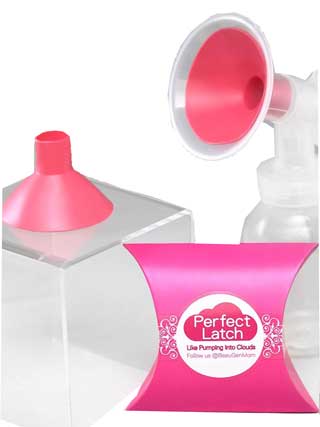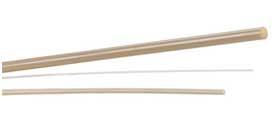Medical updates: Breast pump uses TPE; PEEK use growing in microtube applications for medical implants

BeauGen founders, Christopher Chang and Tu-Hien Le, the husband and wife team that founded the company in 2015, have launched a brand new product with Perfect Latch. Perfect Latch acts as a cushion between the breast pump and the mother’s skin to make it more comfortable to pump and to protect sensitive skin areas. After becoming first-time parents and recognising the unique challenges that mothers in particular face, they dedicated themselves to innovation that improves the lives of moms everywhere. Perfect Latch is BeauGen's first product, designed to revamp one of the least glamorous parts of motherhood by offering a comfortable breast pumping experience.
BeauGen needed a natural material that would be FDA-compliant as well as kind to the skin, flexible and extremely soft. Their challenge was to find a material with an extremely low Shore durometer value and high elongation at its breaking point. In addition, the material had to be colourable, while maintaining its technical properties.
Germany-headquartered KRAIBURG TPE’s compound from the Thermolast K family was the solution for Perfect Latch. As well as meeting all the customer’s technical requirements, it can be produced in small quantities and variously colored.
In other news, speciality chemicals supplier Solvay says that Apollo Medical Extrusion now offers single and multi-lumen medical microtubing extruded from its KetaSpire polyetheretherketone (PEEK). The move signals an important expansion of Apollo’s offering, which already leverages other healthcare polymers including Zeniva PEEK, AvaSpire polyaryletherketone (PAEK) and Veradel HC polyethersulfone (PESU).
“Adding KetaSpire PEEK was a natural response to the increasing requests we’ve received from healthcare customers for single-lumen microtubes extruded from this high-performance material,” said Jonathan Jurgaitis, Senior Process Engineer at Apollo Medical Extrusion. “Interestingly, we have since discovered the demand for PEEK extends to more complex, multi-lumen and stainless steel braided microtube designs as well.”

Apollo Medical Extrusion fabricates a broad range of extruded microtubes for catheter, endoscopy and laparoscopic instruments. With the addition of KetaSpire PEEK to its polymer selection, the company’s off-the-shelf products now encompass three new triple-lumen and 26 single-lumen microtubes made from Solvay’s material, as well as 14 sizes of PEEK rods.
PEEK offers chemical resistance at higher temperatures and retains mechanical properties at continuous-use temperatures up to 240°C. Microtube applications that can benefit from the material’s well-balanced performance profile include those used for atherectomy, arterial ablation, prostate irradiation and tools for placement of medical devices.
Apollo says it will continue to serve Solvay customers who specify Zeniva PEEK to extrude microtubes for use in long-term implantable device applications. Its customers specify AvaSpire PAEK for limited contact applications (≤24 hours) that require an optimal balance of chemical resistance, ductility and toughness. Veradel HC A-301 PESU – the first PESU to offer a detailed FDA Master File (MAF) – further enables Apollo to address microtube applications demanding a high-flow, transparent resin with stiffness and heat resistance.
Like these other speciality polymers, Solvay’s KetaSpire PEEK resins have a robust MAF from the US Food and Drug Administration for limited body contact applications.
“The rising interest in Solvay’s KetaSpire PEEK polymers is explained, in part, by overall growth in the global market for this polymer, which some analysts forecast will expand at an 8.4% compound annual growth rate through 2020,” said Jeff Hrivnak, Global Business Manager for Healthcare at Solvay’s Specialty Polymers global business unit.
(PRA)Copyright (c) 2016 www.plasticsandrubberasia.com. All rights reserved.














































